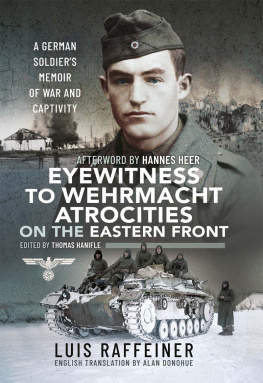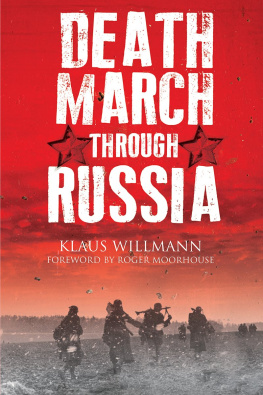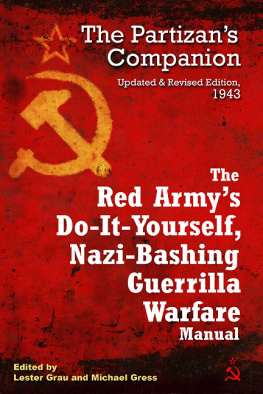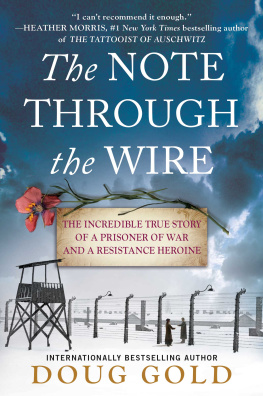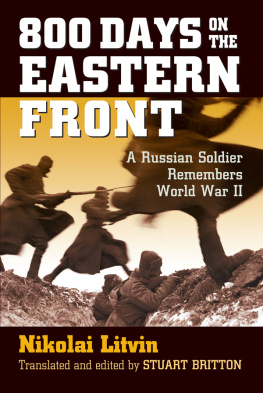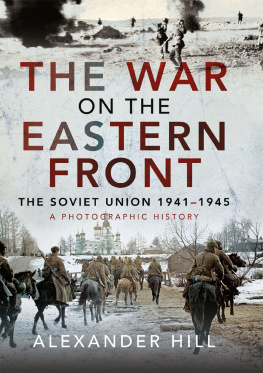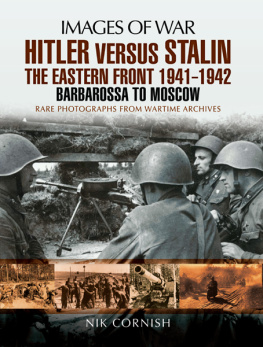

First published in Great Britain in 2006 by
Pen & Sword Military
an imprint of
Pen & Sword Books Ltd
47 Church Street
Barnsley
South Yorkshire
S70 2AS
Copyright Nikolai I. Obrynba, 2006
ISBN 1-84415-428-9
ISBN 978-1-84468-353-6 (ebook)
The right of Nikolai Obrynba to be identified as Author of this Work has been asserted by him in accordance with the Copyright, Designs and Patents Act 1988.
A CIP catalogue record for this book is available from the British Library.
All rights reserved. No part of this book may be reproduced or transmitted in any form or by any means, electronic or mechanical including photocopying, recording or by any information storage and retrieval system, without permission from the Publisher in writing.
Typeset in 10/12pt Sabon by Concept, Huddersfield, West Yorkshire
Printed and bound in England by CPI UK
Pen & Sword Books Ltd incorporates the imprints of Pen & Sword Aviation, Pen & Sword Maritime, Pen & Sword Military, Wharncliffe Local History, Pen & Sword Select, Pen & Sword Military Classics and Leo Cooper.
For a complete list of Pen & Sword titles please contact
PEN & SWORD BOOKS LIMITED
47 Church Street, Barnsley, South Yorkshire, S70 2AS, England
E-mail: enquiries@pen-and-sword.co.uk
Website: www.pen-and-sword.co.uk
In 2001, I paid a visit to my uncle, a veteran of the Second World War, to interview him for my website. After a long and interesting conversation he mentioned: What a pity that my neighbour died some ten years ago! He could have told you some great stories... But why dont we go to see his widow? That was the day I first met Dina Chebanova, an amazing woman who recorded a lifetimes memories by Nikolai Obrynba and arranged them into a book after he passed away. The first Russian edition of this book was released in the early 1990s.
Although the book was printed in the form of a chalk-overlay album the usual method for printing paintings Soviet censorship had reduced the text to a banal collection of victory reports. Dissatisfied, I asked Dina to supply an uncensored version of the text and read it avidly in a few days. But by the end of the reading, I could not help asking myself: How could one man be so lucky? Was he really telling the truth? These questions remained unanswered for a year, until, in August 2002, I drove all the way from Moscow to the Lepel district (part of a Belorussian province of Vitebsk), just to find out if the locals knew of Nikolai Obrynba.
In a local museum I found a photo and a few reprints of Obrynbas canvases. But most importantly, I was able to obtain the telephone numbers of some Partisan Movement veterans. Productive visits to these people resulted in numerous interviews, which are now available through my website (though in Russian only). From these, I was able to achieve my major goal: numerous details described in this book (e.g. the whereabouts of the Partisan artillery battalion and the existence of the telephone net) were fully endorsed. All these men remember the artists, Obrynba and Gutiev vividly: both from the war days and from their later visits to the area. I returned home satisfied and at the same time astonished...
Artem Drabkin
The scale of warfare on the Eastern Front remains ill-conceived by Western society. Moreover, the brutality of the Second World War in Russia and fellow states (where the conflict is known as The Great Patriotic War) is often unjustifiably associated with the concept of Slavic barbarism: an idea established in previous centuries and still welcomed by many. Red Partisan by Nikolai Obrynba is therefore a highly unusual book for the eye of the Western reader yet many Russians would recognize his story as being almost ordinary...
The talented young artist Nikolai Obrynba had no doubt which path to choose when war broke out. Like many men of his generation, he volunteered for the front line. In those days, the path was clear for men who had already served mandatory duty within the Armed Forces or possessed skills considered useful for respective branches of the service. And at the same time, men of humanitarian professions (like the students of Moscow Art Academy) made the only choice that would grant them the possibility of combat: volunteer units. Standing little chance against the battle-hardened units of the German Wermacht, under equipped and poorly trained, Russian volunteers played their bitter role in the days when the Soviet State faced military defeat. Volunteer units became yet another last-stand effort by the Soviet Union: an attempt to throw the enemy off balance and to stop the German juggernaut. The volunteers were used as a military asset to buy time, enabling the Soviet Union to recover from the unprovoked German strike of 22 June 1941. Thus, tens of thousands paid with their lives, wearing down German divisions, destined to fall under the Red Armys blows in the years that followed.
But the days of victory seemed far away for Nikolai Obrynba, and hundreds of thousands of his fellow countrymen, who were unfortunate enough to become prisoners of war on the Eastern Front the only major front in Europe for three consecutive years. The fate of Slavic people (including Russians, Ukrainians and Belorussians) was pre-determined by German war planning: they were to become obedient slaves or be annihilated. To survive, to remain human, to escape: these were three mottos Nikolai was able to keep as a promise to himself through his time in captivity. Being able to escape with a small group of comrades, he made contact with a Partisan unit deep in the forests of Belorussia, and here the second part of this breathtaking story begins.
Mostly autonomous and relying on the support of local peasants, Partisan detachments were a military asset behind enemy lines. Inspired by the example of the Patriotic War of 1812, when armed Partisans or guerrillas helped evict the Grand Army of Napoleon, the Partisan Movement soon became a major force. Teasing extended German communications with great success, the Red Partisans perfected their tactics, forcing German commanders to divert considerable resources and manpower from the front line. Never in modern history had a Partisan Movement played a larger role than in Belorussia, the true Partisan Republic, situated as it was, well behind the official front line. By reading the pages of this remarkable book sharing the pain of bitter defeats and the pride of bloody victories the reader follows the odyssey of Nikolai Obrynba: from a young and inspired artist to a hardened and determined veteran of many battles.
Sergei V. Anisimov
The Partisan Zone or Island of Soviet Power
In early 1943 the Partisans of the Lepel region wiped out German and Polizei forces to create a Partisan Zone. By the end of 1943 the Zone consisted of 250,000 square kilometres. In April 1944 German forces consisting of the 15th, 56th, 82nd, 195th and 252nd Infantry Divisions, the 201st Security division, the 6th Luftwaffe Field division, the 2nd, 12th, and 24th Waffen SS Regiments and supporting Russian Polizei units, cracked the Zone. The Partisans, though lacking heavy weapons, put up a stiff resistance, but by the end of the month were cornered in the Ugly-Selische-Kulgai area. On 3 May 1944, most Partisan units broke through in the direction of Novoe Selo, the rest were dispersed or killed. At the end of June 1944 the region was liberated by the Red Army.


